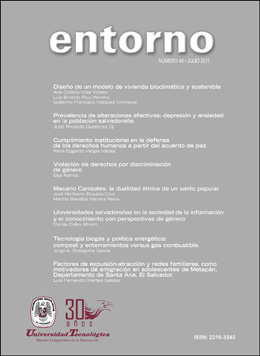Institutional compliance in the defense of human rights based on peace agreements
DOI:
https://doi.org/10.5377/entorno.v0i49.6977Keywords:
The sign of the times, Criterion of truth, Common good, Human rights of first and second generationAbstract
The peace agreement signed between the Government of El Salvador and the bonded insurgency in the Frente Farabundo Marti para la Liberación Nacional (FMLN) was an event of global resonance and an example of what can be achieved with political will, but , having made reborn the people’s dream of a more just, equitable society aimed towards the search for the common good, it soon grew into disillusionment with a reality that was making life increasingly precarious for the great majority of the population, hence our working hypothesis. “The institutions responsible for defending human rights have lacked from creative and clear public policies to meet its mandates,” which we have tried to demonstrate through an analysis based on the systematic integration of different studies on the subject, read through the general framework of political philosophy and the comparative method in legal issues, using themes of institutional assessment model developed by the Centre for Democracy in Central America. After 20 years, the contradiction between the formal commitment to implement the mandated in the Constitution and the impulse model, left us a critical economic and social situation, with the consequent crisis of governance taken by a left aligned government, an event unprecedented in the country in his long political history.
Downloads
516
Downloads
Published
How to Cite
Issue
Section
License
© Entorno
It is required that the authors transfer the right of re-production of their articles to the Entorno Journal

